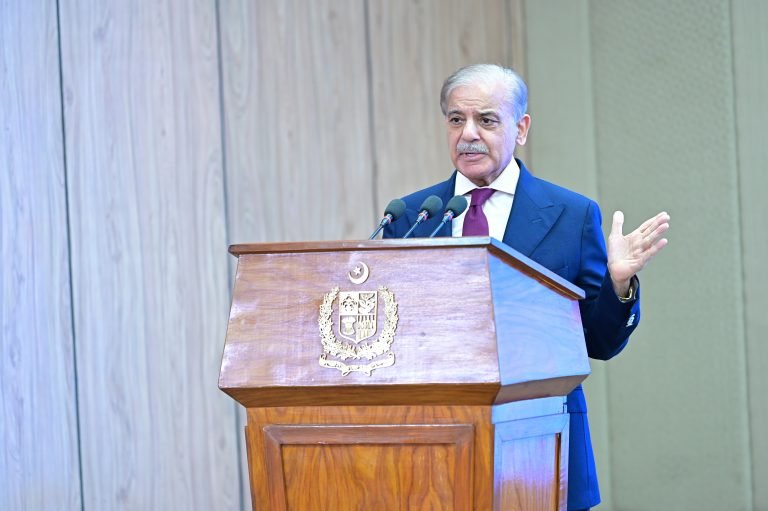
Prime Minister Muhammad Shehbaz Sharif has said that in view of India’s nefarious designs to weaponize water, the government had decided to enhance water storage capacity in the country.
During a visit to the National Emergencies Operations Center, the prime minister stated that an international court (the Permanent Court of Arbitration) had announced a supplemental order, emphasizing that India had no authority to unilaterally suspend the Indus Waters Treaty.
“But the enemy harbors certain evil designs against Pakistan and aims to undermine the waters treaty,” he said, adding that in response, the government had decided to fast-track non-controversial water storage capacity projects under the Water Accord with the provinces, as this had legal provisions.
He stressed that the National Disaster Management Authority (NDMA) had a critical role to play in this context.
The prime minister directed that weather warnings and calamity alerts should be regularly issued via SMS and phone messages, in collaboration with the Pakistan Telecommunication Authority (PTA).
In remarks telecast on national television, the prime minister recalled the devastating impact of the 2022 floods, which caused the entire country to suffer due to the effects of a natural calamity.
He noted that Pakistan, despite contributing very little to global greenhouse gas emissions, was among the countries most vulnerable to natural disasters such as cloudbursts.
“In 2022, Pakistan suffered more than any country in the world,” he observed.
He further stated that glacial melting caused by heatwaves demanded the highest level of preparedness.
“What happened in Swat, where precious lives were lost, cast a shadow of grief over the entire nation,” he said, urging an honest review of the incident and directing the formulation of a comprehensive mechanism in collaboration with the provinces to prevent similar tragedies in the future.
He also called for the compilation of a report in this regard.
The prime minister remarked that in the aftermath of the 2022 floods, relevant ministries had negotiated grants and public-private partnerships for building resilient infrastructure in the country.
He appreciated the National Emergencies Operations Center and expressed hope that relevant authorities would fully utilize this resilient platform to strengthen the country’s economy and social sectors.
He assured the government’s full support in strengthening the institution and enhancing its capacity.
The prime minister also appreciated the NDMA for organizing seamless relief operations to Turkiye and Myanmar.
He expressed hope that this world-class facility was fully connected with the provinces and that its early warning systems were successfully conveying real-time information to provincial authorities.
During the visit, the NDMA Chairman, Lieutenant General Inam Haider Malik, briefed the prime minister on the current monsoon season, flood situations, and precautionary measures taken.
India’s Attempt to Put the Indus Waters Treaty in Abeyance
It merits mentioning that India suspended the Indus Waters Treaty with Pakistan this year. The suspension came in response to an attack in Pahalgam, which India blamed on Pakistan. Pakistan condemned the move, calling it an act of war. The treaty, signed in 1960, governs the sharing of water from the Indus River system between the two countries.
In January 2023, India issued a notice to Pakistan seeking a modification of the Indus Waters Treaty (IWT), citing long-standing objections to Pakistan’s stance on Indian hydropower projects, including Kishanganga and Ratle. This was seen by Pakistan and international observers as an attempt by India to unilaterally put the treaty in abeyance, which is not allowed under its terms.
The Permanent Court of Arbitration (PCA), based in The Hague, in July 2023 ruled that it has jurisdiction to hear Pakistan’s objections and rejected India’s argument that the court lacked authority. The PCA reaffirmed that India cannot unilaterally modify or suspend the treaty, which has been in effect since 1960 and is considered a crucial water-sharing agreement. – APP/ERMD
